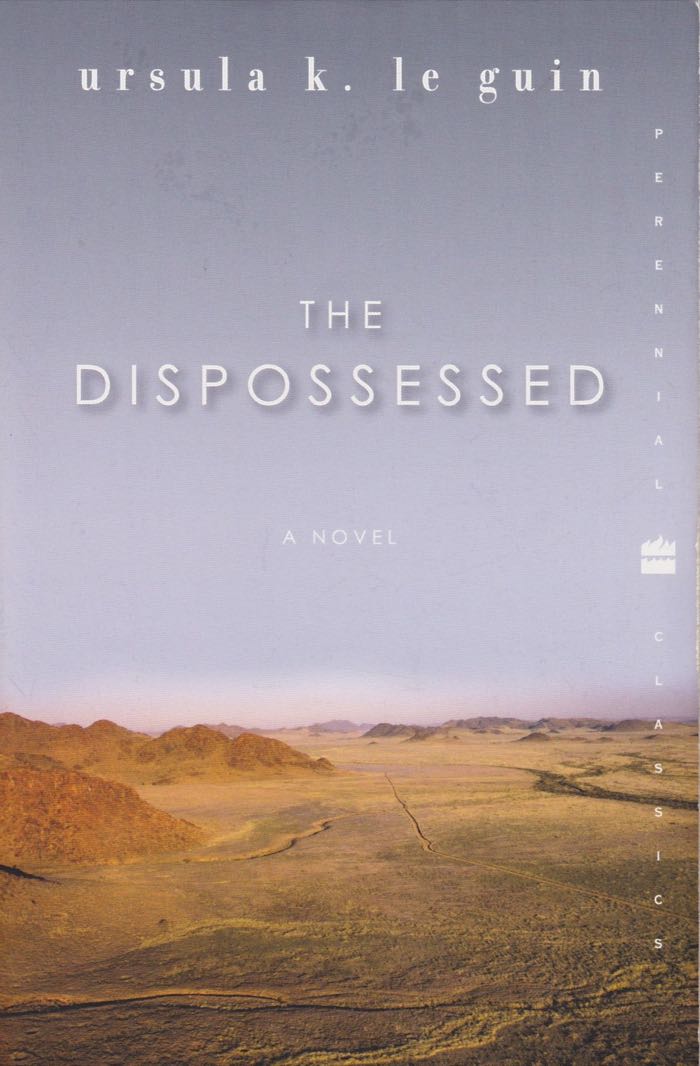The Dispossessed
Reviewed date: 2004 Aug 02
Rating: 4
387 pages
The Dispossessed is utopian science fiction. Or rather, as the book is subtitled, An Ambiguous Utopia. The premise is this: a group of revolutionaries leave the planet Urras and establish a new society on the moon Anarres. The Urrasti are capitalists through and through; the Anarresti follow the teachings of Odo, who preached for a total rejection of the concept of property. Anarres is an "experiment in non-authoritarian communism." All Anarresti work together; in the resource-poor world in which they live, it is only with cooperation that they can manage to scratch out a living; to live alone is to die.
It is not that the Anarresti have no concept of personal property, it is that they consider it immoral. Children are taught to share everything; propertarianism and egoizing are sins. Anarres has no real government, but there is a coordinating organization. No one is required to work, or to accept a job posting, but most do; those who do not work and who do not get along with their neighbors will eventually be cast out of the community. Cast out, they are free to make their own living, but on poor dusty dead Anarres one cannot make a living for oneself; one would starve. And so social pressure and a collective will to survive keeps people together, keeps them working for the good of the society.
Contrast this with the neighboring planet of Urras, by anyone's definition a capitalist paradise. The rich are exceedingly rich, the poor rather well off. The government is strong but not authoritarian; it is openly cruel only in the enforcement of property rights. Urras is rich in technology, resources, and life. Anarres is poor, barren, and barely capable of supporting life. But all Anarresti live and die collectively, together; Urrasti connive and work for personal gain, for private property, they work to become rich and to lord their wealth over the less fortunate.
Which society is better? In which are people more free? Which is more crushing to the free human spirit: property laws that enforce the inequal distribution of wealth and keep the power concentrated in the hands of the rich, or the rigid social structure and customs that command obedience while providing the illusion that because there are no laws, one is free?
It is worth noting that neither Urras nor Anarres can survive without the other. Urras depends on Anarresti mines for critical metals. Anarres could not survive without imported Urrasti technology.
The Dispossessed is an idea book, and in science fiction, idea is King. The Dispossessed rates a four out of five.
All right, I agree that it's probably wise to fear Urras. But why hate? Hate's not functional; why are we taught it? Could it be that if we knew what Urras was really like, we'd like it--some of it--some of us? That what PDC wants to prevent is not just some of them coming here, but some of us wanting to go there?
Nobody goes hungry while another eats. But we have been hungry. We have starved. There was a famine, you know, eight years ago. I knew a woman then who killed her baby, because she had no milk, and there was nothing else, nothing else to give it. It is not all...all milk and honey on Anarres, Efor.
"It is not yours," the one-eyed woman said with the mildness of utter certainty. "Nothing is yours. It is to use. It is to share. If you will not share it, you cannot use it."
"There now Shev. Come on, you know you can't have things. What's wrong with you?"
